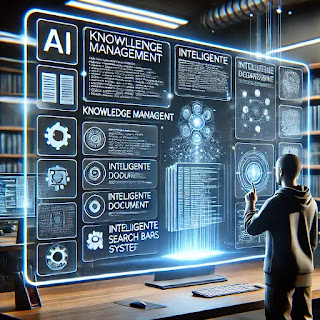AI-Powered Knowledge Management Systems for Developers
In the fast-paced world of software development, accessing the right information at the right time can be a game-changer. Developers often sift through countless documentation pages, community forums, and internal knowledge bases to find solutions. AI-powered knowledge management systems are transforming this process by organizing, storing, and retrieving technical information more efficiently than ever before.
The Role of AI in Knowledge Management
Traditional knowledge management systems rely heavily on manual updates and structured data entry, making them difficult to maintain. AI brings automation, intelligence, and adaptability to knowledge management, helping developers find relevant information faster and with greater accuracy.
1. Automated Information Categorization
AI can analyze and categorize technical documents, support tickets, and code repositories based on context. This helps in structuring information in a way that is easier to navigate and retrieve when needed.
2. Intelligent Search and Retrieval
Unlike traditional keyword-based searches, AI-powered systems use natural language processing (NLP) to understand queries and deliver precise results. Developers can ask questions in everyday language and receive contextually relevant answers.
3. Continuous Learning from Developer Interactions
AI systems improve over time by learning from user queries, interactions, and feedback. By analyzing search patterns and frequently asked questions, these systems refine their responses to offer better recommendations.
4. Integration with Developer Tools
AI-driven knowledge management seamlessly integrates with development environments, chat tools, and project management systems. Whether searching for API documentation in Slack or retrieving past solutions in GitHub, AI ensures knowledge is always within reach.
Benefits of AI-Powered Knowledge Management for Developers
1. Increased Productivity
AI reduces the time spent searching for answers by surfacing relevant documentation instantly. This allows developers to focus more on coding and problem-solving.
2. Improved Collaboration
With AI-driven insights, teams can share knowledge more effectively. Developers can access previous solutions, best practices, and internal documentation without relying on constant peer-to-peer assistance.
3. Reduced Knowledge Silos
AI bridges the gap between fragmented information sources by consolidating and organizing knowledge in a unified system. This prevents knowledge loss when employees leave or when teams work across different time zones.
4. Real-Time Documentation Updates
AI-powered systems can detect changes in codebases and update documentation automatically. This ensures that knowledge bases remain accurate and up to date with minimal manual intervention.
The Future of AI in Developer Knowledge Management
As AI technology continues to advance, knowledge management systems will become even more intuitive, predictive, and proactive. Future enhancements may include:
AI-powered chatbots that provide real-time answers within development environments.
Context-aware recommendations that suggest relevant documentation based on current work.
Personalized learning paths that tailor knowledge resources based on individual developer needs.
With tools like Doc-E.ai leading the way in AI-powered documentation and knowledge management, developers can expect a more seamless and intelligent approach to information retrieval.
Conclusion
AI-powered knowledge management systems are revolutionizing the way developers access and utilize technical information. By automating categorization, improving search capabilities, and integrating with daily workflows, AI ensures that developers can find the right answers faster and more efficiently. As technology evolves, AI-driven knowledge management will continue to enhance developer productivity and collaboration, making it an indispensable tool in the modern software development landscape.


.jpg)
Comments
Post a Comment